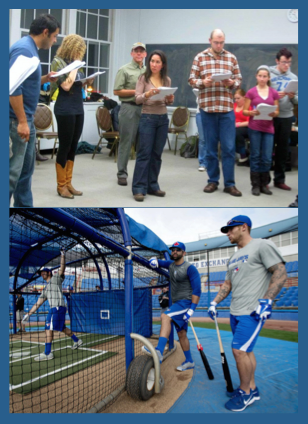When people in a play are getting ready for the performance, they don’t say, “I’m going to practice.” They say, “I’m going to rehearsal.” Many people would use those two words interchangeably and would see any difference between the two as just purely semantics. But they would be wrong.

Like acting, baseball needs continuous tweaking through rehearsal.
Practice is the step by step procedure to turn mechanics into muscle memory. But that implies that a person, in our case a baseball player, knows what those steps are and how to do them. For example, a pitcher knows the step by step procedure of how to cover first base and then practices those steps to ingrain them into his muscle memory. He does this so that when the stress of the game kicks in, his body can go on autopilot and simply repeat what it has been taught to do.
Rehearsal is something entirely different. When an actor learns his lines, he then rehearses them over and over in order to find out how best to deliver those lines. That’s a personal thing that ultimately will be different for every actor. It’s also a messy process that involves constant trial and error. When rehearsing, an actor figures out how to tailor the lines to present them in the best way possible according to the unique talents of the actor. He might rehearse different ways to pronounce certain words. He may move around the stage at certain parts of his performance to see where best to be when presenting certain lines. He may pause at or emphasize different words or phrases to see which ones work best. The lines always stay the same. Rehearsal determines how best to deliver those lines.
I believe there is a place for rehearsal in baseball too. I believe a coach’s job is to teach his players the mechanics (the lines) of the game. From there, players need to rehearse them in order to find out how to tailor those mechanics to fit their own body type, speed, agility, strength, and so forth with the understanding that every player might need to do them slightly different.
When top level players talk to each other about the game, they usually don’t share the standard mechanics of the game. They share how they have tweaked those mechanics (stance, grip, footwork, etc.) to maximize their own performance of those mechanics. Players then go off and rehearse to see how they fit. It’s a constant process of trial and error. Players who do this correctly understand that how they performed the mechanics last game or last season may not be the best for them today.
Practice is necessary to learn the basic mechanics of the game but rehearsal is a component of baseball that needs to be encouraged and stressed as well. In acting, higher level understandings of the lines and how best to perform them cannot happen without continuous rehearsal.
The same goes for baseball.

